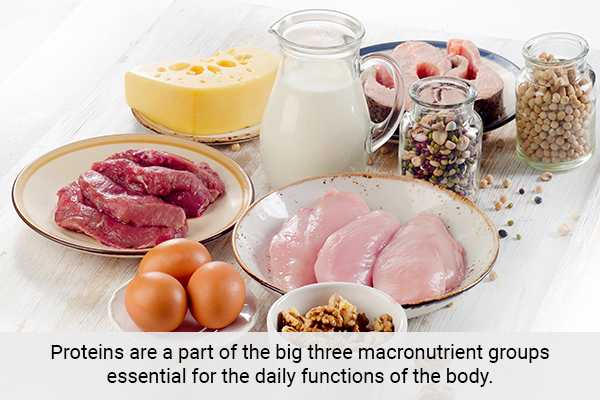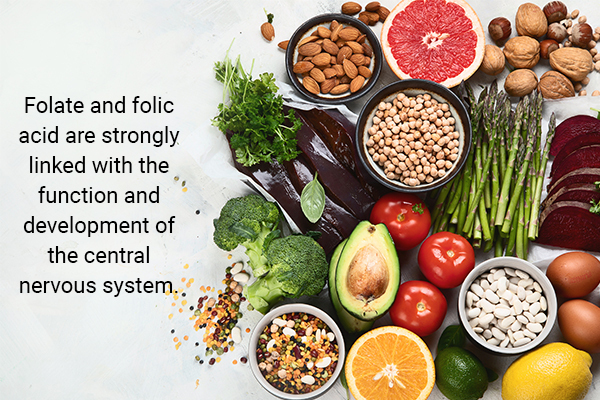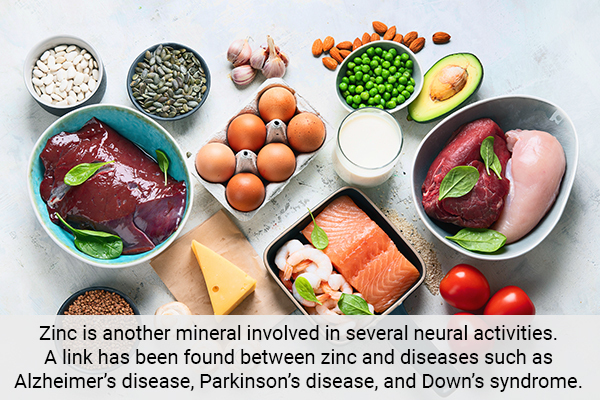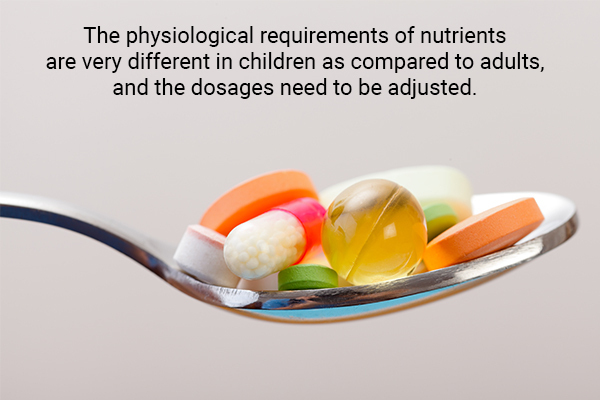In this article:
Mental health has been taking the limelight for a good while now, and rightly so.

Depression is one of the main and most common forms of mental health disorder affecting a large population of the world. (1) Several factors can cause depression, including dysregulation in the body’s hormones, nutrient deficiencies, alterations in sleep, and lack of sunlight exposure. (1)
Many people hesitate to seek help due to the stigma surrounding mental health issues. However, it is very crucial to seek medical intervention before the symptoms worsen.
A medical professional can prescribe medication and other coping mechanisms to manage depression. In addition, they may advise the inclusion of some nutrients in the diet to improve brain health and help alleviate some of the symptoms of depression.
Nutrients Deficiencies That May Cause Depression
Here are some of the nutrients that are crucial to the maintenance of mental health, the deficiencies of which may contribute to depression.
1. Omega 3-fatty acids
Omega-3 fatty acids are a type of fat that is largely responsible for the healthy activity of the brain. The two main types of omega-3 fatty acids are eicosapentaenoic acid (EPA) and docosahexaenoic acid (DHA), which have both been found to be effective in reducing the symptoms of depression. (2)
According to studies, supplementation with omega-3 fatty acids with more than 60% EPA at more or less than 1 g/day can benefit people suffering from depression. (2)
While supplements of omega 3-fatty acids are available, they are also naturally found in flaxseed oil, hemp oil, canola oil, soyabean oil, cod liver oil, walnuts, milk enriched with omega-3, and fish such as salmon, trout, and mackerel. (3)
Precaution needs to be exercised when taking omega-3 supplements as overdosing and toxicity can occur. Consult a doctor to determine the ideal dosage for you and report any discomfort immediately.
2. Proteins

Proteins are a part of the big three macronutrient groups essential for the daily functions of the body. Since proteins are primarily involved in the building and repair of cells, a lack of protein in the diet can result in depression.
A survey that included over 70,000 people in the United States and Korea found that a diet low in protein was associated with a higher risk of depression. (4)
In a recent survey of the US population, total protein intake from milk and milk products was found to reduce the symptoms of depression in adults. (5)
The ideal protein requirement of healthy adults varies between 0.8 g and 2.2 g /kg body weight depending on age and physical activity. (6)
3. Vitamin D
Vitamin D mainly converted in the body upon exposure to sunlight has been linked with depression. (7) The exact mechanism of how vitamin D can affect depression is unknown. However, a study of available data reported that vitamin D supplementation reduced symptoms of depression. (7)
According to the Endocrine Society, the ideal intake of vitamin D should be maintained at 1500–2000 IU (international units).
Very few foods are sources of vitamin D. These include mackerel, salmon, and sardines. Some fortified cereals and dairy products may also provide vitamin D. (8)
4. Vitamin B complex
Vitamin B complex, particularly B1, B3, B6, B9, and B12, are necessary for neural function. Deficiencies of these vitamins have been linked to depression and can impact memory, cause cognitive impairment, and lead to dementia. (9)
Human trials have reported that vitamin B supplementation improved mood and stress, though it did not improve symptoms of depression or anxiety. (10)
Vitamin B can be obtained through food including grains such as rice and wheat, lentil, almonds, peanuts, pistachios, carrots, apples, tomatoes, broccoli, spinach, oranges, meat, eggs, milk and milk products, tuna, and mushrooms. (11)
5. Folate

People suffering from depression reportedly have lower folate levels than those without depression. (12) Folate and folic acid are strongly linked with the function and development of the central nervous system. (13)
In animal studies, folic acid exhibited antidepressant-like effects, prompting its study into a potential supplement to relieve depression and its symptoms. (13)
Natural sources of folate include green leafy vegetables, animal liver, fruits, and fortified cereal products. (14)
6. Magnesium
Magnesium is a mineral involved in several functions in the central nervous system including the transmission of intracellular signaling. Lower levels of magnesium have been observed in cases of depression. (15)
Studies have reported an improvement in depressive symptoms upon supplementing with magnesium. (15) Natural sources of magnesium include green leafy vegetables (such as kale, spinach, and fenugreek leaves), fish, legumes, and whole grains. (16)
7. Iron
Depression has been linked with iron deficiency anemia. Iron is responsible for the formation of hormones that maintain a healthy brain. (17)
Studies have shown an improvement in depressive symptoms upon supplementation with iron. It is also beneficial for women suffering from postpartum depression. (17)
Dietary sources of iron include red meat, organ meats, fish, poultry, eggs, some dark green leafy vegetables, black sesame seeds, and some nuts. (18) Additionally, cooking in iron vessels can also improve the iron content of food.
8. Zinc

Zinc is another mineral involved in several neural activities. A link has been found between zinc and diseases such as Alzheimer’s disease, Parkinson’s disease, and Down’s syndrome. (19)
Studies have found a low level of zinc in people with depression, prompting the use of zinc supplementation for improving mood in both depressed and healthy people. (19)
Its dietary sources include meat and meat products, cereals and grains, milk and dairy products, fish, and some vegetables. (20)
9. Iodine
Iodine is an important mineral involved in many physiological functions of the body. A low iodine level has been found in people with anxiety and depression. (21)
Iodine can be obtained through the use of iodized salt and other fortified food products. It is also naturally present in milk, milk products, and grains such as rice and wheat. (22)
10. Selenium
Selenium is a trace metal required in very small amounts by the body. It is responsible for the maintenance and functioning of the thyroid gland, along with iodine.
Thyroid hormones have been associated with mood disorders, and a deficiency of selenium has been found in people with anxiety and depression irrespective of the levels of thyroid hormones. Through its role in preventing oxidative stress, selenium supplementation can improve symptoms of anxiety and depression. (21)
Its dietary sources include Brazil nuts, cereals and grains, fish, meat and meat products, and milk and dairy products. (20)
Precautions to Consider
Following a healthy well-balanced diet is extremely important in maintaining good physical and mental health. However, in the case of mood disorders, supplementation may be beneficial.
Though most vitamins and minerals can be easily taken as supplements, it is highly advisable to consult a doctor to identify the ideal dosage and duration of supplementation you need.
Most-Asked Questions About Nutrient Deficiencies and Depression
Can I give the supplements to my child?

Children may also be affected by mood disorders, stress, and anxiety. However, the physiological requirements of nutrients are very different in children as compared to adults, and the dosages need to be adjusted. It is recommended to consult your doctor before doing so.
Can I eat food sources of these nutrients to improve my mood?
Dietary sources of nutrients are the safest way to alleviate deficiencies. However, in the cases of severe deficiency or the lack of availability of rich food sources, supplementation is of great help.
Final Word
Mood disorders, particularly depression, have become a growing concern in the modern population. Environmental factors, changes in the body due to medication or illnesses, and even nutrient deficiencies can all contribute to the development of depression.
Certain vitamins and minerals are linked to depression, the deficiencies of which can worsen mood disorders. Supplementation of these nutrients can greatly help, but it is critical to consult a doctor before including any supplements in your diet in order to prevent toxicity, especially in children and the elderly.
- Was this article helpful?
- YES, THANKS!NOT REALLY


